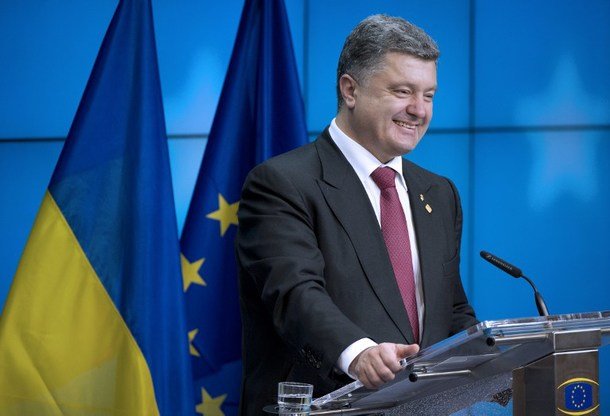
Russia has been given by the European Union one week to reverse course in Ukraine or face new sanctions.
European Council President Herman Van Rompuy said the EU was working urgently on further restrictive measures.
Earlier, Ukrainian President Petro Poroshenko said his country was “close to a point of no return – full scale-war” with Russia.
Russia denies Western accusations that its forces have illegally crossed into Ukraine to support separatists there.
Pro-Russian rebels have made gains against Ukrainian troops in recent days in the eastern Donetsk and Luhansk regions.
Some 2,600 people have died in fighting.
The conflict in the east erupted in April following Russia’s annexation of Ukraine’s southern Crimea peninsula a month before.
Western leaders say there is clear evidence of regular Russian military units operating inside Ukraine with heavy weapons.
Speaking after a summit in Brussels, Herman Van Rompuy said the EU “stands ready to take further significant steps in light of the evolution of the situation on the ground.
“Everybody is fully aware that we have to act quickly.”
Herman Van Rompuy did not specify the nature of further sanctions, but said the proposals would be ready within a week.
The US applauded the EU’s move.

“We welcome the European Council’s consensus today to show strong support for Ukraine’s sovereignty and territorial integrity and to prepare further sanctions for consideration in coming days,” White House National Security spokeswoman Caitlin Hayden said.
The EU and US have already imposed asset freezes and travel bans on many senior Russian officials and separatist leaders in eastern Ukraine.
Western sanctions also restrict loans for Russian state banks, block defense-related technology exports and certain oil industry exports to Russia.
Russia denies that its forces are backing the rebels, instead accusing Ukrainian forces of aggression and deliberately firing at civilians.
Speaking in Brussels, President Petro Poroshenko said Ukraine was a victim of “military aggression and terror”.
“Any offensive action which would be undertaken [by Russia]… would be a point of no return. And that’s why we undertake enormous efforts to stop that.”
Petro Poroshenko also said that he would discuss the possibility of a ceasefire at a meeting in Belarus on Monday of the Contact Group, which includes Ukraine, Russia, Belarus and the Organization for Security and Cooperation in Europe (OSCE).
Federica Mogherini, named on August 31 as Catherine Ashton’s successor, said there could be no military solution to the crisis and that while sanctions were being worked on, the diplomatic process would need to continue.
Ukraine’s government forces have lost ground in recent fighting.
A Ukrainian military spokesman said on August 30 that Russian tanks had attacked the town of Novosvitlivka near Luhansk and “destroyed virtually every house”.
Spokesman Andriy Lysenko said troops had been ordered to retreat from Novosvitlivk.
Ukrainian soldiers have also been trying to evacuate Ilovaisk in the Donetsk region, which has been surrounded by the rebels. Reports say a number of soldiers have been killed in shelling by the separatists.
Rebel leader Alexander Zakharchenko told the Russian News Service radio station a new offensive was being planned to create a corridor between Donetsk and Luhansk.
In south-eastern Ukraine, people have been leaving the port city of Mariupol, after advancing rebels captured Novoazovsk to the east.
Western and Ukrainian officials say this offensive has been substantially helped by Russian regular troops, opening a new front. Russia denies the accusation.
[youtube VKrbJ-dwmxQ 650]